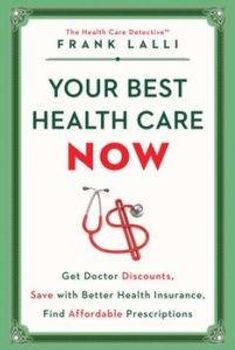How to Get the Best, Affordable Health Care
Smart tips from 'Your Best Health Care Now' author Frank Lalli
We’re told often by policymakers, health insurers and our employers that, these days, you need to be a smart health care consumer. But how?

Insurance and hospital billing statements are indecipherable and filled with unpleasant surprises, doctors won’t reveal their fees and drug companies constantly change what we’re charged. Enter Frank Lalli, the self-described “Health Care Detective.”
Lalli has just written a smart, practical book to help us get discounts from doctors, lower health insurance costs and find affordable prescriptions. It’s called Your Best Health Care Now. If that sounds like a Money magazine headline, it should. Lalli was Money’s managing editor from 1987 to 1998 (and — full disclosure — I worked with him there). These days, he writes for Parade on finding affordable health care and hosts the Health Care Detective podcast, syndicated by NPR.
He’s an expert partly due to his own health. A few years back, Lalli was diagnosed with multiple myeloma — a treatable (but not curable) type of blood cancer. When his former employer announced it would eliminate the $1,000-a-year cap on out-of-pocket prescription drug costs, Lalli wanted to find out how much he'd wind up paying for his pill that retailed for $570 a day. So he put on his detective hat and started nosing around to get an answer.

I recently spoke with Lalli for his advice to Americans 50+ on how to take control of their health care. And, since he’s also sharp on U.S. politics (he edited George magazine, too), I got his take on the health policies of Hillary Clinton and Donald Trump. Highlights:
Next Avenue: Why did you want to write this book?
Frank Lalli: I was going through my own process of trying to navigate our broken health care system and needed to understand the health plan at my former employer — Time Inc. The problem I ran into was nobody at Time Inc. could tell me what the pill would cost next year.
I’m a reporter, so I made 70 calls to 16 institutions [from Medicare to CVS to his former employer] over two weeks. I finally got a straight answer. And guess what? It was going to cost me [just] $2 a day.
My wife, Carole, said: ‘You have to write about this. People are going through what you are, but they don’t have the reporting skills. You need to explain what questions to ask.’ She can be pretty insistent.
Then I wrote an article for The New York Times about my experience and it went viral. And I got calls from agents saying, ‘There’s a book here you ought to write.’ I’ve since interviewed more than 300 people in person and did a lot of reading and research to write the book.
You say our health care system is “broken down.” What do you mean?
It’s hard to get a straight answer from anybody. I was facing back surgery and was assured by a couple of people at my insurer that it wouldn’t cost me anything. Something didn’t ring right to me. I didn’t think my insurance was that good. I made a third call and they put the supervisor on who said: ‘Oh, hold on a minute. You know what? It’s not covered at all.’ It would cost me $25,000. I think that happens all the time.
If you’re sitting in the waiting room, look around. Someone there is paying half of what you are paying.
Are people doing a good job getting the best and most affordable health care they can?
No, they’re not. A high percentage of people on Medicare don’t get preventive care that they’re covered for. Some people have a fear of doctors or put off medical care. They need to be educated.
But it’s hard to get answers.
That’s true. Doctors aren’t volunteering information. I find insurance companies to be very bureaucratic and uncooperative.
How has Obamacare changed what people need to do to get the best health care?
Most people are getting these policies for $100 a month or so, but the policies are pretty bare bones. And the inexpensive premiums can come with $5,000 deductibles. Can you afford that if you get sick?
A lot of people are now facing the high cost of out-of-network doctors, especially at in-network hospitals.
That’s a big problem. A lot of emergency rooms have been farmed out to doctors around town. So the hospital is covered by your plan, but the doctor you see there is not covered. If you’re in an ER, you’re not going to sit up from the gurney and say; ‘Do you take Emblem?’
So what should you do when shopping for health insurance?
You should look at the whole plan: the deductibles, which hospitals are covered and whether specialists you’ll see are in the plan. Don’t take the word of the insurance company. Call your doctor and ask: ‘Will you be in this specific plan next year?’
Make a couple of phone calls to protect yourself and do some serious shopping. I’ve seen surveys saying that 40 to 60 percent of people with Medicare Part D drug plans don’t bother to shop. But 90 percent of them could save money if they did.
You don’t think employers' “consumer-directed health plans” are as good for consumers as they sound?
No, not at all. Mostly, they end up being Health Savings Accounts, or HSAs, with high annual deductibles, sometimes beyond $1,000. If you have money in the bank and you’re young, an HSA can be very beneficial. But you have to be careful if you get sick. It can come back and bite you.
How should you negotiate with your doctor?
You have to explain your financial situation. I’ve had a couple of back surgeries and in the second one, the surgeon — who’s one of the best in the world — estimated the charge would be $40,000. He said: ‘Talk to my business people. I’m sure they can come up with a price that’s better than that.’ I talked to them and they said I’d be charged $20,000. I called back and said: ‘That’s an awful lot.’ And they came back with $15,000, which sounded like the last offer. I called back and said: ‘Let me explain my finances’ and a day later, the doctor dropped the fee to $10,000.
Can anybody do what you did? You’re pretty famous.
Yes they can. I’m not that famous. Anything I did, you can do.
A lot of doctors have a good heart. They went into this profession to help and cure people. One doctor I interviewed said: ‘I never let money get between me and my patient.’ I think most doctors have that point of view.
What’s the best way to lower prescription drug costs?
The first thing is to talk with your doctor and say: ‘Why do I need this medicine at this dosage?’ Then say: ‘Do you have any samples? Doctors often have cabinets full of free samples dropped off by salespeople of pharmaceutical companies. And doctors can also give out sample cards.
You were able to get the cost of your original blood cancer drug, Revlimid, down to $2 a day. And you’re now getting your current blood cancer drug, Pomalyst, for free even though it retails for $809.52 a day. What can the rest of us learn from your detective work?
If you have to take an extremely expensive drug and don’t have insurance or the insurance covers just a small amount, contact the manufacturer. The most cooperative people I ran into researching this book were at the drug companies. You can wind up wasting months or years fighting with your insurer.
Who should you ask for at the drug company?
Just say: ‘I need to talk to people who can help people who need the drug but can’t afford it.’ They’ll connect you.
What’s the best way to lower your hospital bill?
My No. 1 tip is to negotiate the price before you have the procedure. Hospitals are competitive.
Should you work through the billing department?
No. That’s a collection agency; they want to collect as much money as they can. Go to the ombudsman and say: ‘I want to talk to someone to make a plan so I can come in for affordable care at your hospital.' The ombudsman has a very different mindset than the billing department. Their job is to help.
Should you hire a patient advocate to help you navigate the health care system?
In most cases, you can do these things yourself. But a patient advocate can be helpful in a complicated situation with a health insurance company. And where an advocate helps a lot is if you get a big surprise bill from a hospital. That happens often; 50 percent of hospital bills have significant errors. A patient advocate can look at the medical codes and see where there’s duplication.
Does it matter to us as health care consumers whether Hillary Clinton or Donald Trump becomes president?
It matters an awful lot. With Trump, read his health plans. I have. It’s a joke. He’s calling for things that are already law and have been done for 10 years, like high-deductible plans and HSAs. I think it’s willful ignorance on his part. I don’t think he has a health plan at all.
Hillary blows with the wind. Her big thing is to put heat on the big pharmaceutical companies. She says she won’t stand for more exorbitant increases. Get the clown who raised the price of his drug 5,000 percent. He’s a jerk and a problem. But how about all the other guys in pin-striped suits raising drug prices 10 or 13 percent across the board, doubling prices over five years? This is not a bad apple situation.
Don’t expect Congress to do much about it. Chuck Schumer [a Democratic Senator from New York] has been talking about bad apples and he’s taking as much money as he can from pharmaceutical companies.
Will Hillary be better on health care? Sure. But will Congress solve these entrenched problems? They couldn’t get it together to put money up for Zika! You can’t count on Washington.


